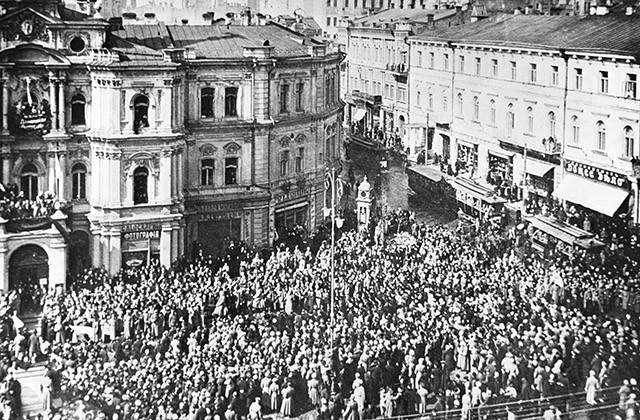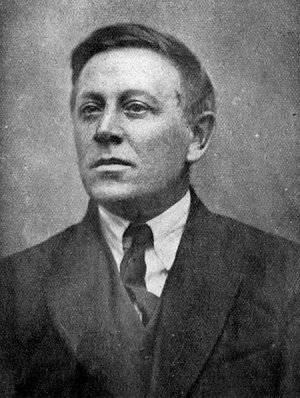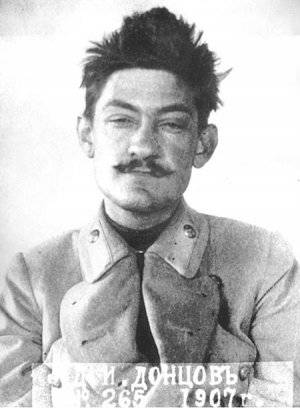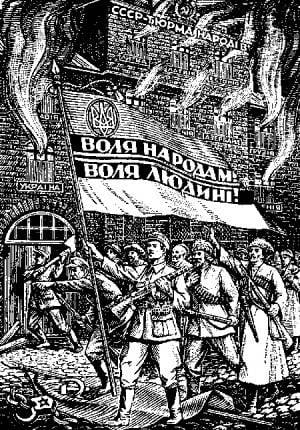Ukrainian nationalism: left course and right vibrations

Nationalism in Ukraine emerged as a Left-wing Democratic movement, but over time evolved into a “third way”
Soviet propaganda has taught us that bourgeois nationalism opposed socialist internationalism in the USSR. Thus, in one of his works, Stalin wrote about this confrontation during the Civil War: “The struggle of marginal" governments "was and remains the struggle of bourgeois counter-revolution against socialism. The national flag is tacked on to the business only to deceive the masses, as a popular flag convenient for covering the counter-revolutionary designs of the national bourgeoisie. ”
Some national movements that opposed the Bolsheviks were indeed right-conservative, but not all. The Georgian state, for example, was headed by the Social Democrats, only not by the Bolsheviks, but by the Mensheviks, who, as is now clear, were no less, or even more Marxists. The Armenian Revolutionary Federation Dashnaktsutyun, which fought the communists, was also close to the Socialist Revolutionaries.
But of particular interest is Ukraine, which, unlike other national suburbs of the former empire, still continues to be perceived by a significant part of Russians as part of the “Russian world”. In this sense, in relation to Ukrainian nationalism, there are two interconnected myths at once.
The first is that it was an artificial project created by foreign special services and not having the support of the people - the “Little Russians”, who consider themselves to be exclusively part of the “triune Russian people”. Second, that it was “reactionary bourgeois nationalism”, hostile to the aspirations and interests of the Ukrainian “working people”. Actually, these two cliches largely determine the perception of Ukrainian nationalism and today, which allows some to hope that one day it will evaporate like smoke.
Left roots of Ukrainian nationalism
What really represents Ukrainian nationalism, and how in just one century did he manage to become a force that brought one of the largest in life and in terms of the population of Europe?
Contrary to Soviet propaganda myths, Ukrainian nationalism was initially leftist and populist. Russian social thought of the 19th and early 20th centuries, as is known, fell into three main areas: conservative, liberal and left-democratic. Ukrainians also had representatives of their own liberal (Drahomanov) and conservative (Lypynsky) thoughts, but there were no serious objective prerequisites for their development, because both the nobility and the bourgeoisie in these lands were Little Russian, that is, they did not have Ukrainian national identity or hostile to him. It is significant in this sense that the Little Russians made up the majority of the members of the Union of the Russian People and other Russian right-wing conservative organizations, and since 1905, it was Kiev that was the capital of the Russian Black Hundreds and nationalism.
Therefore, the Ukrainian national self-consciousness developed in the framework of the third, social democratic direction or in close connection with it. However, unlike the Russian social democracy in Ukraine, which relied on the urban - Russian, mixed and russified proletariat, Ukrainian social democracy relied on a mono-ethnic Ukrainian village.
The singer of the Ukrainian village and the first bright forerunner of Ukrainian nationalism was, of course, the leftist Taras Shevchenko. Socialist national trend was the second most important for Ukrainian literature of the time Lesya Ukrainka. Eser was the founder of the Ukrainian national historical school Mikhail Grushevsky, who, after surrendering to the Soviet regime, continued his work in the structures of communist Ukraine. The first political ideologist of Ukrainian nationalism, Nikolai Mikhnovsky, as a student, began his political activities in the Social Democratic circle, but came to the conclusion that the Ukrainians needed an organization combining socialist and national ideas, establishing the Brotherhood of Tarasovites (in honor of Taras Shevchenko). Finally, the founder of the first independent Ukraine, Simon Petlyura, was an active participant in the Revolutionary Ukrainian Party, whose program, minus national requirements, was almost identical to the program of the Russian Mensheviks and Socialist Revolutionaries.
 Simon Petliura, 1926 year.
Simon Petliura, 1926 year.However, does it make sense to “read” these requirements? After all, the Russian left-wing parties recognized the right of peoples to defend their national interests within the framework of a federal state, into which Russia should have been turned after the revolution. Interestingly, Petlyura, who is the personification of separatism in Russia, did not claim more. After the February Revolution, the Ukrainian Central Council formed by its Revolutionary Ukrainian Party insisted on granting Ukraine autonomy, and its chairman, Grushevsky, was elected to the Russian Constituent Assembly, which in no way indicates irreconcilable separatism. And only after the Bolsheviks dispersed the Constituent Assembly, in which, we recall, the majority of deputies were also leftist (Social Revolutionaries and Mensheviks) Rada announced the creation of an independent Ukraine.
A stroke to the same picture is the fact that during the First World War, Simon Petlyura, unlike the Ukrainian nationalists-emigrants under the supervision of the Austro-Hungarian General Staff, did not come from anti-Russian, but from pro-Russian positions, considering that Ukrainians should protect their common homeland, but Russia should recognize their national rights.
Thus, Ukrainian political nationalism was not just left-wing, but was originally born as part of the revolutionary democratic movement ideologically united for all of imperial Russia. Only over time does he come into conflict not even with all of his Russian colleagues, but with only one of their factions, the Bolsheviks, and after their victory he takes on unequivocally separatist positions.
However, interestingly, the first serious enemies for the Ukrainian left-wing nationalists were not the Moscow Bolsheviks, who were still too weak for this, but the Ukrainian right-wing conservatives led by the hetman Skoropadsky. His project, under which the ideological basis (of Ukrainian hetmanism) was one of the few Ukrainian conservatives Lipinsky, was so romantic, was a very interesting idea, an analogue of the project of another Russian officer - Carl Gustav Mannerheim, who did not change the oath to the emperor.
Mannerheim, seeing that a large country is slipping into chaos and tyranny, created an effective state thanks to the alliance of the Finnish Swedish aristocracy and the Finnish intelligentsia and the bourgeoisie. Something similar was trying to do in Ukraine and Skoropadsky, uniting the hetman of Ukrainians and Russians around the strong power. However, the project Skoropadsky suspended in the air - the great-power-minded Russian officers, which he relied on as the backbone of his army, the project was abhorred as “independent”, for the Ukrainian peasant masses, it was primarily socially alien.
The social aspirations of the Ukrainian peasant masses were expressed by the Ukrainian left, left nationalists, led by Petliura, who created the Ukrainian People's Republic. However, it was not so much the Russian left that killed the Ukrainian left — this was already a consequence, not a cause. The Ukrainian left was ruined by the emergence of the Ukrainian extreme left: the Makhnovists and the Borotbists, who split their forces when they had to fight - and for a long time successfully - on two fronts: the Russian right-wing imperials (Denikinists) and the Russian left-wing Imperials (Bolsheviks). The fact is that Makhno relied exactly on the same social strata as the main Ukrainian left revolutionaries (Petliurists), pulling them down.
There is a theory according to which the most bitter struggle flares up between the most closely related species - there is no other way to explain the hatred Makhno felt for the same Ukrainian-Ukrainian Petlyurites, branding them with bourgeois. The Petliurists, of course, were not bourgeois, but they were nationalists who fought for a united Ukraine, while Makhno, acting in its south, was an anarchist regionalist who did not recognize the power of either Kiev or Moscow. Nevertheless, in their struggle, he in fact involuntarily supported the Bolsheviks, which naturally ended with the defeat of both Ukrainian left-wing projects: both national and anarcho-regionalist.
Right turn
The victory of the Bolsheviks led to the beginning of the ideological evolution of many people and forces not only in Russia, but throughout Europe. Indicative in this sense is the fate of the Russian revolutionary Boris Savinkov, who was a Social Revolutionary for most of his life, but at the end began to sympathize with Italian fascism. However, let us not forget that the very first fascism, Italian, arose on the basis of the socialist newspaper Avanti and was created by its editor, a member of the Italian socialist party, Benito Mussolini.
Fascism is usually regarded as a separate political direction, the “third way”, distinguished by a number of independent signs such as activism, corporatism, leaderism, nationalism and militarism. In this sense, it is made up of two sources: right and left, becoming the product of their radicalization and synthesis. Right was inherent militarism and nationalism, but not mass activism and socialism. The leftists, on the contrary, traditionally appealed to the masses, but they were not inherent, at least, ideological militarism and authoritarianism - they appeared everywhere in fact, but everywhere they were tried to camouflage and justify them as forced and temporary phenomena.
 Dmitro Dontsov.
Dmitro Dontsov.Ukrainian nationalism, as has already been said, was initially left-wing - nothing right, conservative there was simply no place to take, especially after the defeat of Skoropadsky by the forces of the Ukrainian left-wing nationalists. However, after the defeat of his left-wing Russian colleagues, he begins to evolve in the same direction in which the initially left Savinkov and Mussolini evolved - towards fascism. The key figure of this evolution is the bright political thinker, publicist, philosopher, ideologist of Ukrainian integral nationalism, Dmitro Dontsov.
Interest is already the genesis of this person, both political and ethnic. Dontsov began his activities as a classic social democrat, and not a national focus as a party, but a member of the Ukrainian Social Democratic Labor Party, a breakaway party. This fact, coupled with the Russian surname (he grew up in a German-Italian-Ukrainian-Russian Tauride family) allowed some at that time to curse as a “Moskal” person who, after some time, would become the most militant ideologue of Ukrainian nationalism.
As in the case of the Russian Social Democrats and the leader of their radical wing Lenin, his political emigration became the impetus for the radicalization of Dontsov. Against the background of the repressions, Petliura remained in the Empire and, as we remember, during the First World War he defended. For Dontsov, the gap in emigration means a bet on the formation of militant Ukrainian nationalism under the auspices of the enemy of Russia - Austria-Hungary. He becomes a nationalist, for whom, unlike Petliura, party and ideological biases no longer matter in principle - this, apparently, explains the fact that he equally successfully works first on the hetman’s Ukraine Skoropadsky, to which he returns with the German troops and then to Petliur's UNR.
Such a non-partisan system remains inherent in Dontsov in the future, when he, having come closer to one or another organization, then moving away from them, becomes his own size — an ideologue that influences all Ukrainian nationalism. The latter is formed and reorganized after the defeat of the UPR, which is important - not in Ukraine, where it grew out of the left idea, but in the Ukrainian emigration, which was formed on the principles of radical, all-consuming nationalism.
OUN - UPA: left revenge
Dontsov was the voice of his time, an esthete, a Ukrainian Nietzschean, and in this sense his influence on the mentality of Ukrainian nationalists was epochal. However, this influence, like a changeable fashion, was rather aesthetic, cultural, but unable to change the “political DNA” of Ukrainian nationalism. Dontsov's "integral nationalism", leaderism and mysticism were the driving force of the legendary Organization of Ukrainian Nationalists, although, according to the recollections of his sister, Bandera himself before the Holodomor happened, considered Lenin his political ideal.
However, very quickly the romantic-fascist ideology of the OUN begins to blur under the influence of leftist sentiments of the masses. This was facilitated by two circumstances.
First, the OUN, not being the politically leading force in Western Ukraine, managed to win this leadership by its desperate and effective revolutionary struggle, which drew the most radical forces of Ukrainians to it. And among them a considerable part were former communists and other leftists who were disillusioned with the cannibalistic (Holodomor) and imperialist (Molotov-Ribbentrop pact) policies of red Moscow.
 Propaganda poster of the UPA, 1948 year
Propaganda poster of the UPA, 1948 yearSecondly, with the invasion of the Germans in the USSR, which the OUN tried to use to unleash the national liberation struggle, later on two fronts (as it turned out later), its emissaries rapidly moved to the east of Ukraine, where they had to correct their ideology on the fly. With the disappearance of non-alternative communists in one-party society, the OUN was the only Ukrainian political and national power that filled this vacuum. However, the sentiments of yesterday’s sub-Soviet population differed significantly from the romantic Fascist ideas of the OUN, nurtured in emigration, and - we must pay tribute to their strategic insight - the leaders of the OUN, who had powerful counterintelligence, were able to assess this fact and draw conclusions from it.
The management of the Bandera OUN (and there was still a competing "Menshevik" OUN of Melnik) is conducting an organizational and theoretical reform, the result of which is the holding of the Third Extraordinary Great Collection of the OUN in August 1943. It accepts policy statements and demands that return the Ukrainian movement to the ideological origins of Petliura's left-wing nationalism. Initially, the very first UPA (Ukrainian Insurgent Army) was left-democratic in its ideological attitudes, whose source — the Poles'e Sech Army — was created by Borovets; ", That is, philistinism.
And despite the fact that the OUN was able to absorb UPA, and brutally eliminating its old leadership, this process could not take place without an ideological transformation. One of its manifestations was that in some places, Bandera preferred to act not under the OUN brand, but under the brand of the People’s Liberation Revolutionary Organization, which was specially created to accumulate leftist sympathies.
The neutral name of the Ukrainian Insurgent Army in some cases was more effective than the national fundamentalist OUN. Moreover, in the conditions of a difficult struggle on two fronts with the Germans and the Soviets and confronted with the realities of a big Ukraine, and not its western part, orthodox nationalists go on internationalist maneuvers. So, a few months after the third congress of the OUN, Ukrainian nationalists are holding the First Conference of the oppressed peoples of Eastern Europe and Asia. If Dontsov's ideas were characterized by imperial pathos, by analogy with Italian fascism that inspired him, now Ukrainian nationalism is given an anti-imperialist character and proclaims a course toward international-nationalists of all peoples opposing oppression.
In the UPA, foreign divisions, including Russian ("Russian"), are being created. In this sense, another ideological adjustment is characteristic - if Dontsov’s ideas were Russophobic in the full sense of the word, then the new course of the UPA shares Russian and Russian imperialism, recognizing the Russians, like any other nation, the right to self-determination within national borders, their rights as a national minority of Ukraine.
The Second World War ended in 1945, but, as is known, the focal partisan resistance of Bandera lasted until almost the mid-fifties. However, in these post-war years there is an actual split between the political leadership of the OUN, led by Bandera, who migrated to emigration, and those UPA leaders who moved even more to the left of the 1943 resolutions of the year. The left wing of the UPA, which remained in Ukraine, actually moved to the national-Marxist positions, declaring its goal to build a classless society in independent Ukraine.
The remnants of the OUN, which, unlike the UPA, survived the defeat in emigration, rejected such a “heresy”, since now it was possible to return to refined nationalism again, without looking at the sentiments of the sub-Soviet masses. Nevertheless, although the end of Ukrainian nationalism in emigration has come to an end, the ideological foundations of Ukrainian nationalism left in the 1943 year, making it a successor of the Petliura case, have not been revised.
Post-Soviet Stage: From National Democracy to Social-Nationalism
The third wave of Ukrainian nationalism, this time resulting in the creation of the most durable at the moment independent Ukrainian state, occurred in the post-Soviet years. In fairness, however, it must be said that an independent Ukraine was created by the Ukrainian party nomenklatura, and not by ideological nationalists whose merits in this matter were recognized purely symbolically.
At the same time, ideological Ukrainian nationalists in the post-Soviet period were represented by the right - national liberals and national democrats from the movement “RUH” to Viktor Yushchenko. The left, socialist vector became the property of the anti-nationalist, alliance-oriented forces.
This continued until the defeat of the Orange Revolution, which simultaneously became the defeat of the shabby post-Soviet nationalists - national democrats like Yushchenko. However, the rule of Yanukovych gave rise to a new Ukrainian nationalism, more radical and continuing the social line of the Petliurists, Bandera and even the late UPA, who went to the split with the OUN. Representatives of the latter were “autonomous nationalists”, standing on the positions of a classless society and denial of the state, that is, essentially national anarchism, the fashion for which came to the CIS precisely through Ukraine (it’s no secret that Russian Volnitsa was essentially a subsidiary of Ukrainian "Autonomies").
Such radical social-nationalists could be considered an absolutely marginal phenomenon, if it were not for the fact that their representative Yury Mikhalchishin soon becomes one of the leaders of Freedom, who promptly burst into Ukrainian politics already in the tenth years of the new century.
This is no accident, because the odious “Freedom” is nothing more than a new brand of the even more odious Social-Nationalist Party of Ukraine, which has existed for a total of twenty years. This party inherited the Don aesthetics of 1920 — 30's, considering itself, however, to continue the cause of the entire OUN-UPA. However, the exit from the niche of the marginal neo-fascist movement, localized in Western Ukraine, into a large all-Ukrainian policy for Ukrainian nationalists was once again associated with fielding, namely betting on social populism and socialist nationalism.
However, despite all the successes, radical Ukrainian nationalists hardly have a chance to come to power in the country, almost half of whose population has a post-Soviet mentality and worldview. New Bandera would have chances only in a compact Ukraine, without the Soviet East and the South, not to mention the Crimea, however, like their colleagues, Russian nationalists, the supporters, they are not ready to sacrifice the “single-indivisible” for the sake of “national purity” And if so, it means that in order to complete the work of the Ukrainian nation-building, a new hetman Skoropadsky is needed rather than Petlyura or Bandera. However, he is quite able to rely on the images and ideas of the latter, which are inscribed in a broader state context.
Information